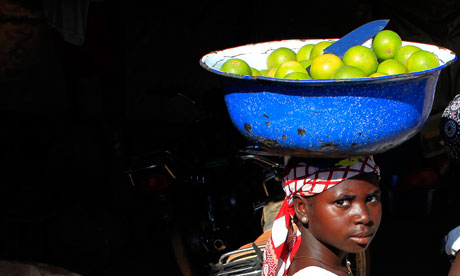
Noo (pronounced Gnaw) Saro-Wiwa is an adventurous soul. She spent most of the four months she was in Nigeria for this book either travelling in the fabled "flying coffins", the craft of African airlines, or holed up in one or other of the country's notoriously shabby hotels, usually without electricity or running water. She is also lucky. In the three years since she undertook the journey, the country has become a far more dangerous place, as shown by the bombings of two churches on Christmas Day by Islamic fundamentalists opposed to western-style education. The country is fast falling apart – although if you listened to the government, which only listens to itself, you'd hardly think so.
Saro-Wiwa's journey begins at Gatwick, with a cancelled flight and the usual mayhem associated with Nigerians abroad. She is suitably embarrassed as she watches "our national image sink further in the eyes of the world" for which she blames decades of corruption that "have made us deeply suspicious of authority". I'm not at all sure about her analysis – Nigerians are hardly the only people to have suffered such over the past half-century – but more telling is her use of the personal pronoun.
Growing up in "leafy Surrey" and educated at Roedean and the universities of London and Columbia, her only childhood experiences of Nigeria were her annual forays to "my unglamorous, godforsaken motherland with its penchant for noise and disorder". Five years after her last visit as a 14-year-old in 1990, her father, Ken Saro-Wiwa, the environmental activist and sometime writer, was judicially murdered, an event that might reasonably have put her off the country for life.
The constant intrusion of the personal pronoun – "Our farming is largely a small-scale affair with no machinery or fertiliser", "The previous administration sank $13.2bn into restoring our power network, but there is nothing to show for it", "But over time, I had come to love many things about Nigeria: our indigenous heritage … " – sits uneasily within the narrative. It suggests an intimacy that is at odds with her predicament as a foreigner who happens to have been born to Nigerian parents. This is a pity. Had she acknowledged that she was seeing Nigeria largely through western eyes she might have opened up connections between where she is and where she has come from that would have thrown light on both.
Take the vulgarity and ostentation that are the supposed hallmarks of the small band of Nigeria's super-rich. At one point in her journey, Saro-Wiwa visits the country home of Dr Peter Odili, the former two-term governor of oil-rich Rivers State: "But what good had Odili really done for Ndoni? The town was still a quiet backwater: messy-haired women still sold fruit and groundnuts on the side of the spotless streets; the school building was a shabby confection of peeling yellow paint, and the pupils sat around in tatty uniforms." Well and good, and accurate enough as far as it goes. But compare this with the observations of a true-born Englishman, the journalist Michael Peel, observing the same sort of scene in A Swamp Full of Dollars, an account of his own recent journey around the country: "Already I could see many common themes. The rich men's houses … were no more obscene than their counterparts in London; their opulence was simply starker compared with the general standard of living."
Having made a deeper connection, Peel is then in a position to draw parallels between the oil wealth in one and the oil wealth in the other. This is the tragedy of Nigeria in general and of Saro-Wiwa in particular, as it was her father's agitation for greater resource control that led to his gruesome hanging. "Nor were the Delta resource control disputes so different in essence from the campaign of the Scottish nationalists for dominion of the UK oil pumped off Scotland's shores," Peel writes. "That, too, can be cast as a story of historical oppression and growing resistance to a nation state that some see as an unwanted fiction. In Nigeria, guns and deeper poverty have simply bolstered the polemic."
Like her brother, Ken Wiwa Jr, whose book In the Shadow of a Saint (2000) was an attempt to come to terms with this awkward entity called Nigeria from the perspective of an English boarding school, Noo Saro-Wiwa wonders whether her upbringing has unfitted her for life in Nigeria. "Western prosperity had made me less hardy," she admits, "and given me a sense of entitlement to easy mobility that I was terrified of losing. I felt a renewed gratitude towards my parents for giving me the life that I had."
In effect, she answers her own question. She quotes, as her brother did before her, their father's reason for sending them abroad in the first place, which was that their expensive education would enable them to return home and serve their nation. Instead, it appears to have achieved the opposite.
It's not, in fact, as simple as that. No existing education, whether in Nigeria or elsewhere, would make anybody fit for life in the country, as the great army of unemployed Nigerian graduates readily testifies. This has much to do with the reason why Ken Saro-Wiwa chose to educate his children abroad: a profound lack of belief, on the part of Nigerian people, in their ability to determine their own destiny. As a result, they must look to foreigners for the transformation of their richly endowed nation (of which oil is merely a part) in order for it to take its rightful place in the world, instead of which it continues to wallow in the abject poverty that so distresses the author of this book.
Adewale Maja-Pearce's latest book is A Peculiar Tragedy: JP Clark-Bekederemo and the Beginning of Modern Nigerian Literature in English.

